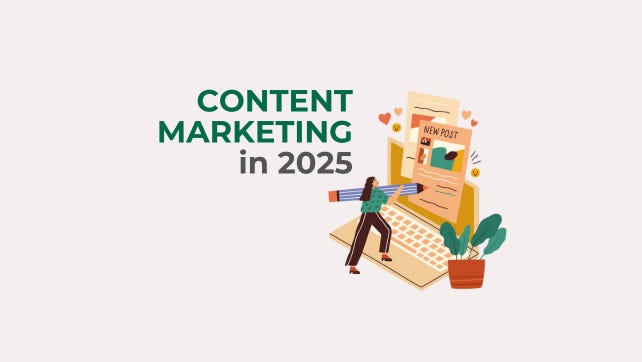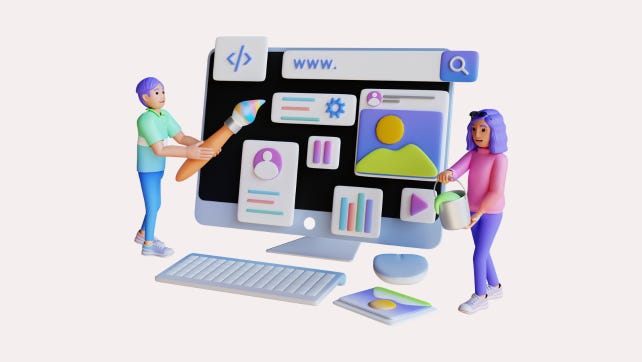Content Marketing in 2025
Learn how to create a winning content marketing strategy that drives results in 2025.
Content marketing is constantly evolving, and staying ahead of the curve is more critical than ever. As we navigate the dynamic digital landscape of 2025, let's explore the key trends and strategies that will shape the future of content marketing. From the rise of AI to the importance of authenticity and the need for data-driven decision-making, content marketing in 2025 presents both challenges and opportunities for marketers.
The Rise of AI in Content Creation
Artificial intelligence (AI) is no longer a futuristic concept; it's a tangible reality that's transforming the way marketers create content. AI-powered tools are becoming increasingly sophisticated, enabling marketers to generate various content formats, from text and images to videos, with big efficiency.
One of the significant benefits of AI in content creation is its ability to streamline workflows and enhance productivity. By automating repetitive tasks such as generating product descriptions or social media posts, AI frees up marketers to focus on more strategic initiatives.
For instance, AI-powered writing assistants can help you generate different types of marketing copy, from catchy headlines and engaging ad copy to informative blog posts and persuasive sales emails. These tools can analyze vast amounts of data to identify patterns and trends in language, enabling them to produce high-quality content that resonates with your target audience.
Moreover, AI can help ensure consistency in brand voice and messaging across all content formats. By analyzing your existing content, AI tools can learn your brand's unique style and tone, ensuring that all new content aligns with your brand guidelines.
However, while AI offers numerous advantages, it's important to remember that human oversight remains important. AI should be seen as a tool to enhance creativity and efficiency, not to replace human input entirely.
Influencer Marketing and the Importance of Authenticity
In an era where consumers are bombarded with marketing messages, authenticity has become more important than ever. Influencer marketing continues to thrive because it taps into the power of trust and genuine connection. By partnering with individuals who have established credibility and a loyal following, brands can reach new audiences and build deeper relationships.
However, it's important to choose influencers who genuinely align with your brand values and resonate with your target audience. Authenticity is key to building trust and driving meaningful engagement.
For example, if your brand promotes sustainable and eco-friendly products, partnering with an influencer who advocates for environmental causes can be a powerful way to connect with your target audience and build credibility.
Short-Form Video: Essential for Your Content Strategy
The rise of short-form video is undeniable. Platforms like TikTok, Instagram Reels, and YouTube Shorts have captured the attention of millions, offering a dynamic and engaging way to connect with audiences.
As a content creator myself, I've seen firsthand the power of short-form video to capture attention, convey messages quickly, and spark conversations. It's a format that can be used for everything from product demos and behind-the-scenes sneak peeks to user-generated content and interactive challenges.
Short-form video is particularly effective for reaching younger audiences who have grown up with mobile devices and social media. Its bite-sized, easily digestible format aligns perfectly with their consumption habits and preferences.
Diversifying Your Content Marketing Strategies
Content marketing is not a one-size-fits-all approach. To succeed in 2025, marketers need to embrace a diverse range of strategies that cater to their audience's preferences and align with their business goals. This could involve:
Blogging: Creating informative and engaging blog posts that address your audience's needs and interests.
Video Marketing: Leveraging the power of video to tell stories, showcase products, and connect with your audience.
Podcasting: Offering valuable insights and entertainment through audio content.
Infographics: Presenting complex information in a visually appealing and easily digestible format.
Email Marketing: Nurturing leads and building relationships through personalized email campaigns.
Social Media Marketing: Engaging with your audience and promoting your content on various social media platforms.
Reaching Your Audience Effectively with Content Distribution in 2025
Creating high-quality content is only half the battle. Effectively distributing it is important for reaching your target audience and maximizing the impact of your efforts. Content distribution involves utilizing various channels to promote your content and ensure it gets seen by the right people.
Owned Channels: These are platforms that your brand owns and controls, such as your website, blog, and social media accounts. Owned channels provide a direct line to your audience and allow you to build a loyal following.
Earned Channels: These are platforms where your content is shared organically by others, such as through media coverage, social media shares, and guest blogging. Earned channels can significantly expand your reach and build credibility.
Paid Channels: These involve investing in advertising or sponsorships to promote your content, such as through social media ads, influencer collaborations, and sponsored content. Paid channels can be effective for reaching a wider audience and driving traffic to your content.
Measuring the Effectiveness of Your Content Marketing with Data
Measuring the effectiveness of your content marketing efforts is paramount for optimizing your strategy and achieving your goals. Data and statistics provide valuable insights into what's working and what's not, allowing you to make informed decisions and refine your approach.
Tools like Google Analytics, Semrush, and Ahrefs offer a wealth of data that can help you track your content's performance, understand user behavior, and identify areas for improvement.
Challenges and Opportunities for Content Marketers in 2025
Content marketers in 2025 face a dynamic landscape with both challenges and opportunities:
Challenges:
Maintaining authenticity in the age of AI-generated content.
Delivering hyper-personalized experiences at scale.
Cutting through the noise and capturing attention in a crowded digital world.
Measuring the ROI of content marketing efforts and demonstrating their value.
Opportunities:
Leveraging AI for efficiency and personalization.
Creating interactive and immersive content experiences.
Building communities and fostering engagement.
Optimizing content for answer engines and voice search.
Predictions for the Future of Content Marketing
While the content marketing landscape is ever-evolving, here are some predictions for what we might see in the years to come:
The Rise of Interactive Content: Interactive content, such as quizzes, polls, and interactive infographics, will become increasingly popular as a way to engage audiences and gather valuable data.
The metaverse and immersive experiences: As the metaverse continues to develop, brands will explore new ways to create immersive content experiences that blur the lines between the physical and digital worlds.
Hyper-Personalization: AI and machine learning will enable marketers to deliver hyper-personalized content experiences tailored to individual user preferences and behaviors.
The Growing Importance of Community: Building strong communities around your brand will become even more crucial for fostering engagement and loyalty.
The Evolving Role of Content Creators
As content marketing continues to evolve, so too will the role of the content creator. Marketers will need to adapt and acquire new skills to stay ahead of the curve. Here are some key skills that will be essential for content creators in 2025 and beyond:
Data Analysis: Content creators will need to be comfortable analyzing data and using insights to inform their content strategy.
SEO and AEO: Understanding search engine optimization (SEO) and answer engine optimization (AEO) will be important for ensuring content is discoverable and ranks well.
AI and Automation: Content creators will need to be familiar with AI-powered tools and how to leverage them effectively.
Creativity and Storytelling: The ability to craft compelling narratives and engage audiences through storytelling will remain essential.
Adaptability: Content creators will need to be adaptable and embrace new technologies and platforms as they emerge.
The Importance of Ethical Content Marketing
As content marketing becomes more sophisticated, ethical considerations will become increasingly important. Content creators will need to be mindful of issues such as:
Transparency and Disclosure: Clearly disclose any sponsored content or affiliate relationships.
Data Privacy: Respect user data and privacy.
Accuracy and Fact-Checking: Ensure that all content is accurate and factual.
Avoiding Misinformation: Be responsible for the information you share and avoid spreading misinformation.
Conclusion
Content marketing in 2025 is a dynamic and evolving field. By leveraging new technologies, understanding their audience, and staying adaptable, marketers can navigate the challenges and capitalize on the upcoming opportunities . The key to success is to create valuable, engaging content that resonates with your audience and drives meaningful results.






